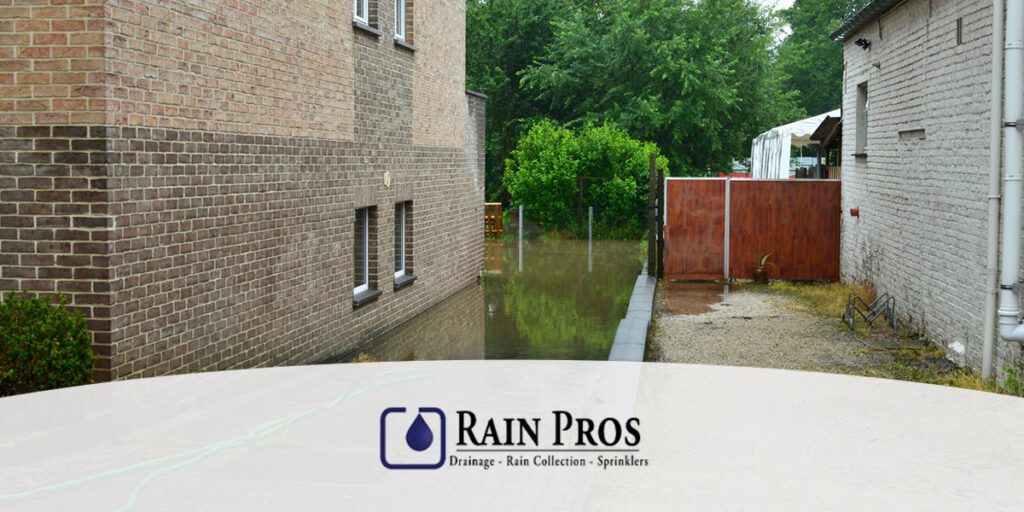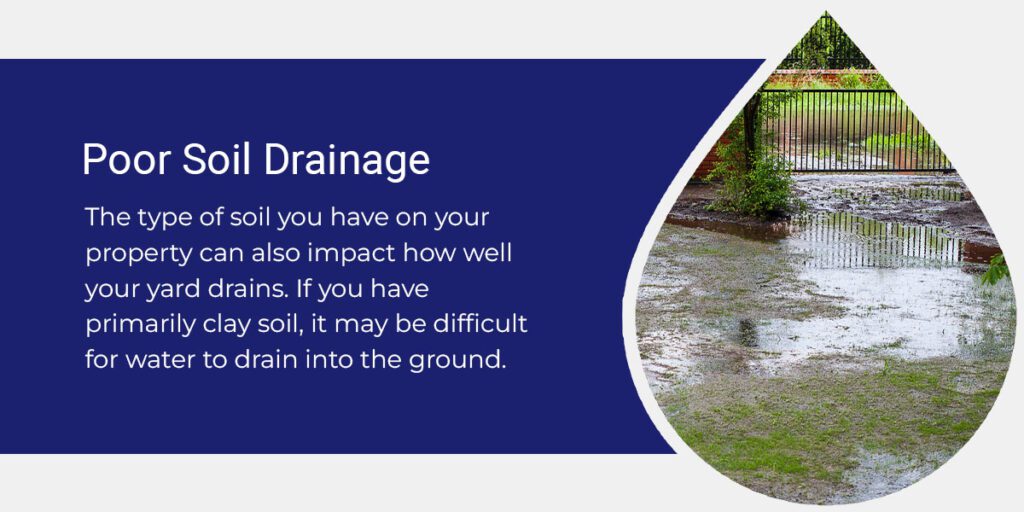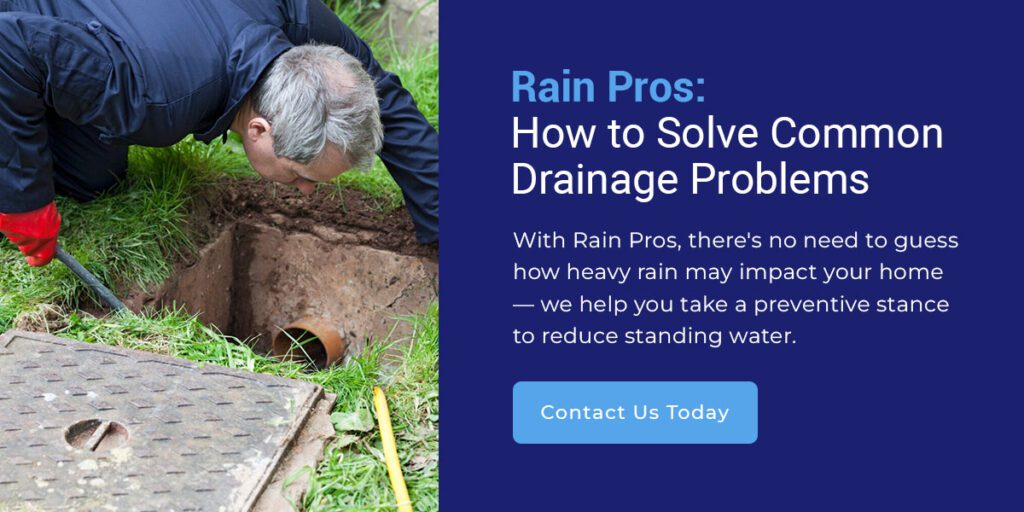5 Common Drainage Problems and How to Solve Them

When it rains on your property, where does the water go? Many homeowners don’t ask this question until they’ve experienced a flooded basement or another serious problem. If you start problem-solving about your property’s water flow now, you can redirect the water on your property before there’s an issue.
Some areas of the Pacific Northwest are arid, while other parts resemble rainforests. For example, different areas of Washington state get between 7 inches and 150 inches of precipitation a year, according to the Western Regional Climate Center. If you live in an area with high levels of rainfall, you need to consider drainage on your property. Here are five common drainage problems in the Pacific Northwest and how you can solve them.
1. Water Pooling Around Your Home
One of the most serious issues you can have with water drainage is pooling around your foundation. Over time, pooled rainwater can cause flooding in your basement and even degrade your home’s foundation. To protect your property, it’s essential to redirect water that’s gathering against the side of your home.
Waterproofing your basement or crawl space can help protect your home from flooding during heavy rains. Another solution is to add a sump pump to your basement or install a foundation drain that can divert water out from under your home. The best solution depends on your specific situation and long-term goals.
You can also tackle water pooling around your foundation by improving the overall drainage system on your property. Changing landscape grading, improving your soil and redirecting gutters can all affect how much water ends up against the side of your home during a storm.
2. Improper Landscape Grading
Landscape grading refers to the shape of the ground around your home. If your house is situated at a low point, water will drain toward it and may even be trapped around it. Poor grading can flood your basement and crawl spaces and damage your home’s foundation over time.
To fix grading issues, you can hire a landscaping company to reshape your property so water naturally flows away from your home. Of course, it’s important to consider your neighbors during this process. If possible, the goal is to transfer excess rainfall to the street, where city drainage will take care of it.
Many homeowners also install underground drainage systems to help eliminate standing water in their yards. These systems use a series of drains, pipes and gravel to collect and redirect water. The size of this system depends on how much rainfall you get and how much water you need to remove from your property. Again, it’s essential to think about where the water you redirect will go next.

3. Poor Soil Drainage
The type of soil you have on your property can also impact how well your yard drains. If you have primarily clay soil, it may be difficult for water to drain into the ground. Homeowners with clay or compacted soil tend to experience more water pooling and large amounts of water run-off.
Plant vegetation can improve drainage because the root systems break up compacted soil underground. Gravel, silt, loam and sandy soil all drain more easily than clay. The Puget Sound is home to a wide variety of soil types, and most homeowners experience a mix of several. Identifying your soil type can help you make better decisions about drainage for your property.
If you’re noticing large amounts of pooled water and run-off, you may have soil that’s not absorbing water easily. You can improve this issue with French drains and other underground drainage systems. French drains allow water to soak through gravel into perforated pipes that run underground. The water is then channeled away from your home and flooded areas.
4. Gutter Spout Overflow
If your gutter spouts become blocked or are placed poorly, they can also cause drainage issues. Gutters are designed to drain water off your home’s roof and then divert it away from your home’s foundation. Your roof is sloped so that water runs off into your gutter system.
Because gutters are so important for drainage, you should clean them at least once a year. If your gutters become clogged with leaves, pine needles and other plant material, they won’t be able to do their job. If you’re concerned about climbing a ladder to reach your gutters, consider hiring a professional service. Cleaning your gutters is not worth risking personal injury.
Downspouts are the gutter pieces that carry water down from the roof and away from your home. If your spouts aren’t long enough or are placed poorly, they can contribute to a drainage issue. The next time it rains, go outside to see how your gutters and downspouts are performing. You may be able to significantly improve your property’s water drainage by moving or lengthening gutter spouts.
5. Infrastructure for Excess Storm Water
If your property struggles to handle average rainfall, imagine what it may experience during a heavy storm. Homeowners who live in areas of the Pacific Northwest with heavy rain and annual stormy weather should consider investing in additional drainage to protect their property.
Larger pipes, underground wells and pumps can all help manage heavy rainfall. If you’re concerned about how your home will handle a storm, you can consult drainage experts to create a custom plan for your property. The best solution is to have multiple paths for water to drain away from your home safely and into a larger municipal system or reservoir.
In addition to storms, new land development can cause changes for homeowners. You can protect your property from neighboring drainage by understanding your property’s slope and installing systems to keep water away from your home’s foundation. Investing in drainage solutions for heavy rainfall will give you peace of mind and help you enjoy your property for years.

Rain Pros: How to Solve Common Drainage Problems
Rain Pros has been solving common drainage problems in Washington state since 2006. We offer custom sprinkler and drainage designs that consider your property, goals and budget. With Rain Pros, there’s no need to guess how heavy rain may impact your home — we help you take a preventive stance to reduce standing water.
Our services can bring you peace of mind and help to protect your property from water damage. We believe preventive steps are always more effective and less expensive than handling water damage after an event. Contact us today to discover the best solution for your drainage issue!
